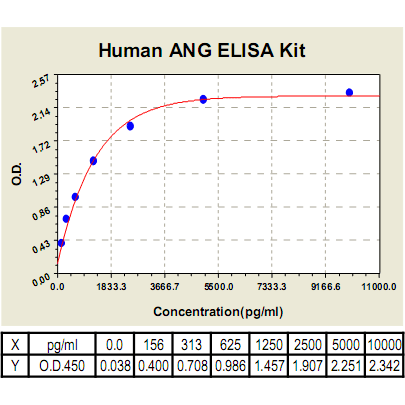ANG ELISA Kit, Human
Human ANG/Angiogenin ELISA Kit: Human Angiogenin ELISA Kit
Size: 96 Wells
Price: $500.00
Description
Angiogenin is now recognized as a pleiotropic molecule capable of inducing several intra- and extracellular activities. It induces most of the individual events in the process of angiogenesis including binding to endothelial cells, stimulating second messengers, mediating cell adhesion, activating cell-associated proteinases, inducing cell invasion, stimulating DNA synthesis and cell proliferation, and organizing the formation of tubular structures from cultured endothelial cells. It was shown that angiogenin binds to the endothelial cell surface, interacts with a 170 kDa putative receptor or a 42 kDa binding protein on the cell surface. Angiogenin undergoes nuclear translocation in endothelial cells, which is essential for its biologic activity. When nuclear translocation is inhibited, its angiogenic activity is abolished. It was shown that angiogenin is able to bind to the ribosomal DNA (rDNA) and to stimulate rRNA transcription. Since rRNA transcription regulates ribosome production and, consequently, the translation potential of a cell, angiogenin-induced rRNA transcription is required for endothelial cell proliferation induced by other angiogenic factors. In addition, Angiogenin displays limited ribonuclease activity. The activity of angiogenin can be blocked by ribonuclease inhibitors, including a specific inhibitor of mammalians, designated RAI (ribonuclease/angiogenin inhibitor). Highly basic proteins (poly-arginine, poly-lysine, poly-ornithine, core histones, spermatid-specific S1 protein, and the protamines HP3 and Z3) strongly inhibit angiogenin binding to the inhibitor and may be potential regulators of angiogenin-triggered angiogenesis and/or intracellular inhibitor functions. Blocking of the ribonuclease activity concomitantly also blocks the angiogenic activity of angiogenin. Mutations that enhance ribonuclease activity also enhance the angiogenic activity. Very likely, the biological activity of angiogenin is due to the cell activation of accessory cells, which then secrete cytokines causing cell activation of endothelial cells. The activity of angiogenin as an angiogenesis factor is blocked by Angiostatin.2 In addition to its well-known role in mediating angiogenesis, human angiogenin also directly stimulates prostate cancer cell proliferation.3 Furthermore, it was shown that the serum angiogenin level increases in patients with nasopharyngeal carcinoma, and is correlate with primary tumor progression. In addition, angiogenin has also been reported to suppress significantly the proliferation of human lymphocytes stimulated by a mixed-lymphocyte culture or by phytohemagglutinin or concanavalin A. It also inhibits both spontaneous and peptide-stimulated degranulation of polymorphonuclear leukocytes.4
2. Kong, H.L. & Crystal, R.G.: J. NCI 90:274-86, 1998
3. Yoshioka, N. et al: Proc. Natl. Acad. Sci. USA 103:14519-24, 2006
4. Tschesche, H. et al: J. Biol. Chem. 269:30274-80, 1994
Details
| Cat.No.: | CL0305 |
| Target Protein Species: | Human |
| Range: | 62.5pg/ml-4000pg/ml |
| Specificity: | No detectable cross-reactivity with any other cytokine. |
| Storage: | Store at 4°C. Use within 6 months. |
